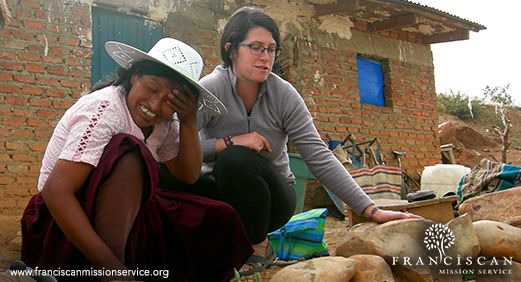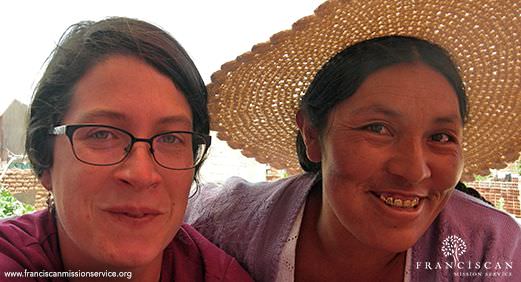Letting Go of Being Thought Good

Editor’s Note: Missioner Annemarie Barrett reflects on how her views of lay mission have changed since she first arrived in Bolivia and how the friendships she’s formed there have challenged and inspired her.
Francis of Assisi was known to say, “We must bear patiently not being good and not being thought good.”
The first time that I heard this statement, it felt like the wind had been knocked out of me.
What was being Catholic if not the constant pursuit of being good, and if not always able to be good then at the very least be thought good?
Becoming a Franciscan lay missioner at times felt like an assurance of my goodness, as if being a young adult committed to service and solidarity was akin to sainthood.
But any confusion that I felt about the experience of being put on a pedestal as a Catholic lay missioner gradually transformed through the relationships that I have formed during my time in Bolivia.
Any pressure that I felt to be good or be thought good slowly diminished as I spent more and more time with people in the local community that knew well the failures and weaknesses of foreigners, especially Catholic lay missioners. They knew our struggle to speak and understand the local language well, our embarrassingly weak stomachs, and our often-rigid inability to really just be ourselves without any pretenses.
I found that my friends in the local community here knew my failures and weaknesses at times better than I did; I was the one who kept missing the opportunity to really admit them to myself. I saw my imperfections more as a challenge to improve than as an invitation to vulnerability, humility, and intimacy.
In time I realized that the more I focused on being good or being thought good, the more distance I created between myself and my community. In many ways, I was not trusted because I was thought to be too good; my goodness was not relatable, and I was the last one to recognize it.
I have had to wake up to the reality that I am not always good, and no one else is either. Liberating ourselves from that pretense can bring us closer together.
Letting go of needing to be good or thought good almost feels like standing naked and exposed; it reminds me of what Francis of Assisi might have felt when he famously stripped off his clothes and renounced his privilege and wealth. This is an experience I could not relate to until recently as I honor my own process of stripping off my layers of pretense, a process that has brought me closer to my community and invited deep spiritual growth.
Through this process I have been invited to relish in my humanity, to dance and sing together, eat and drink together, and to laugh and cry together. Through these relationships I have witnessed the constant discrimination that my friends in these marginalized communities experience and heard what it is like for them to not be thought good.
I have learned from these friends how to celebrate one another while not being thought good, which is an incredible act of resistance and solidarity in a world filled with hate and fear.
Reflection Questions: During Lent and throughout the rest of the year, how can Francis of Assisi’s example lead us to greater humility? What does being patient with not being good mean to you? How can greater vulnerability invite us to greater intimacy and connection?
Tagged in:



